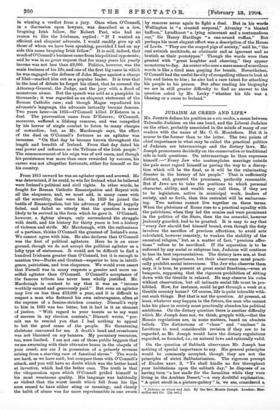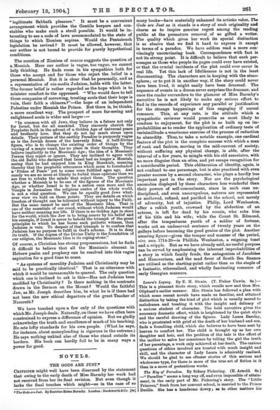JITDAISM AS CREED AND LIFE.*
Mn. JOSEPH defines his position as a via media, a mean between Talmudic Judaism on the one hand, and the Liberal Judaism on the other, probably associated in the minds of many of our readers with the name of Mr. C. G. Montefiore. But it is nearer to the former than to the latter. The two points of chief importance in what may be called the practical politics of Judaism are intermarriage and the dietary laws. Mr. Joseph pronounces decidedly on the conservative or traditional side in both questions. On intermarriage he thus expresses himself :—" Every Jew who contemplates marriage outside the pale must regard himself as paving the way to a disrup- tion which will be the final, as it will be the culminating disaster in the history of his people." That is sufficiently distinct, and, granted the premisses, perfectly reasonable. But if Jews are to take the positions to which personal character, ability, and wealth may call them, if they are to be legislators, active in municipal work, leaders of society, and so forth, then this restraint will be embarrass- ing. Two nations cannot live together on these terms. When the plebeians of Rome rose to a practical equality with the patricians, when they led the armies and were prominent in the politics of the State, then the ius connubii, however jealously guarded, had to be granted. It is easy to say that "every Jew should feel himself bound, even though the duty involves the sacrifice of precious affections, to avoid acts calculated, however remotely, to weaken the stability of the ancestral religion," but, as a matter of fact, "precious affec- tions" refuse to be sacrificed. If the separation is to be enforced by any social or religious ban, Judaism will continue to lose its best representatives. The dietary laws are, at first sight, of less importance, but their observance must practi- cally prohibit social intercourse. The Jew who observes them may, it is true, be present at great social functions,—even at banquets, supposing that the rigorous prohibition of sitting down with the Gentile is relaxed. He may observe his rules without observation, but all intimate social life must be pro. hibited. How, for instance, could he get through a week at a Gentile country house ? Of course, life is quite tolerable with- out such things. But that is not the question. At present, at least, whatever may happen in the future, the man who cannot take his place in society must practically abandon his political ambitions. On the dietary question there is another difficulty which Mr. Joseph does not, we think, grapple with,—that the Mosaic regulations are, in some matters, based on obsolete beliefs. The distinctions of " clean " and " unclean " in Leviticus xi. need considerable revision if they are to be regarded, as Mr. Joseph would have the dietary regulations regarded, as founded, i.e., on natural laws and rationally valid.
On the question of Sabbath observance Mr. Joseph has nothing of special importance to say. His general principles would be commonly accepted, though they are not the principles of strict Sabbataria,nism. The rigorous precept of Exodus xxxv. 3, "Ye shall kindle no fire throughout your habitations upon the sabbath day," he disposes of as having been "a law made for the Israelites while they were living in the Arabian Desert,"—a very doubtful explanation. "A quiet stroll in a picture-gallery" is, we see, considered a • Judaea'', as Creed and Life. By the Bev. Morris Joseph. London: Mao. millan and Co. [5i.3. net.]
I. legitimate Sabbath pleasure." It must be a convenient arrangement which provides the Gentile keepers and con- stables who make such a stroll possible. It would be in.
teresting to see a code of laws accommodated to the state of things to which Zionism aspires. Would the Pentateuch legislation be revived ? It must be allowed, however, that our author is not bound to provide for purely hypothetical The mention of Zionism of course suggests the question of a Messiah. Here our author is vague, too vague, we cannot help thinking. He finds room in his sympathies both for those who accept and for those who reject the ,belief in a
personal Messiah. But it is clear that he personally, and as a representative of via-media Judaism, holds with the latter. The former belief is rather regarded as the hope which is to minister comfort to the oppressed. "Who would dare to tell these companies of sorrowing, trusting souls that their hope is vain, their faith a chimera P"—the hope of an independent Palestine under Messiah the Prince. But there is, he thinks, a more excellent way. The prospect of more far-seeing and enlightened souls is wider and larger :— " In common with all Jews, they believe in a future not only for Israel, but for all mankind. They sincerely cherish the Prophetic faith in the advent of a Golden Age of universal peace and brotherly love. But they do not lay much stress upon details. Their picture of the earthly Paradise is purposely vague as is the Jewish dream of the heavenly Eden. A half-Divine figure, who is to change the existing order of things by the waving of a magic wand, has no place in their thoughts. They believe implicitly in the Messianic Age ; the idea of a Messianic Person they reject or ignore. They are inclined to agree with the old Rabbi who declared that Israel had no longer a Messiah, seeing that he had enjoyed him in King Hezekiah, meaning thereby that the prophetic utterances which seem to foreshadow a 'Prince of Peace' yet to come were fulfilled ages ago. And surely we are no more at liberty to forbid these opinions than we are free to rebuke the minds that reject them. The question whether a Messiah is to be one of the figures of the Messianic Age, or whether Israel is to be a nation once more and the Temple in Jerusalem the religious centre of the whole world, is not a vital question. We can be equally good Jews what- ever view we hold on these points. They are details on which' freedom of thought can be tolerated without injury to the Faith. But the same cannot be said of the Messianic Idea. That is one of the essentials of our creed, without which Judaism would have neither meaning nor life. If there is no Golden Age in store for the world, which the Jew is to bring nearer by his belief and his example, if Israel is never to behold the triumph of the great principles to which he has borne such pathetic witness, then Judaism is vain. To despair of that triumph is to confess that Judaism has no purpose to fulfil in God's scheme. It is to deny its truth. If the dogma of the Divine Unity is the foundation of our religion, the Messianic Idea is its coping-stone."
Of course, a Christian has strong prepossessions, but he finds it difficult to believe that all the Messianic element in Hebrew psalm and prophecy can be resolved into this vague aspiration for a good time to come.
"As systems of morality Judaism and Christianity may be said to be practically identical." That is an utterance with which it would be unreasonable to quarrel. The only question which one is inclined to ask is this—Has not Judaism been modified by Christianity ? Is there nothing in the contrasts drawn in the Sermon on the Mount ? Would the faithful Jew, as Mr. Joseph describes him, be what he is if there had not been the new ethical departure of the great Teacher of Nazareth ?
We have touched upon a few only of the questions with which Mr. Joseph deals. Naturally, on these we have often been constrained to express a difference of opinion. But we gladly acknowledge the truth and excellence of much of his teaching. He sets lofty standards for his own people. (What he says, for instance, about moneylending is rigorous in the extreme.) He says nothing unkind also of those who stand outside its borders. His book can hardly fail to be in many ways a power for good.







































 Previous page
Previous page